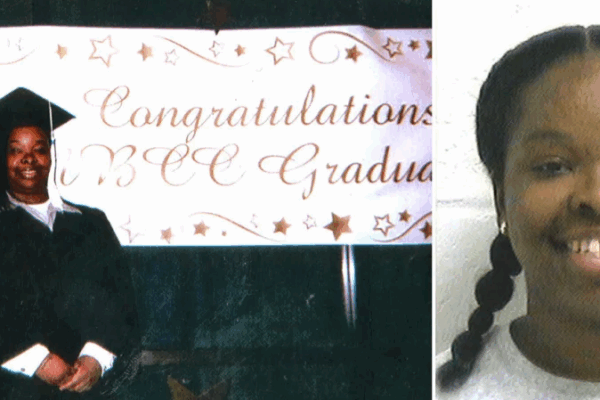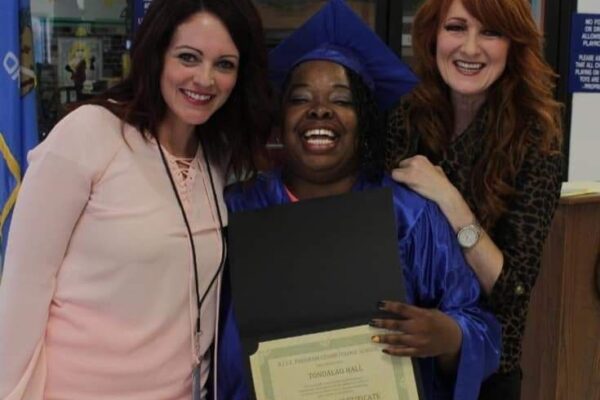On December 12, Oklahoma mother of three, Tondalao Hall, with her ACLU attorneys, will take a crucial step in the long and tedious process to challenge her excessive sentence and to free her from Mabel Bassett Correctional Center.
Tondalao is one of the many domestic violence survivors imprisoned for her “failure to protect” her children from her abuser. She has served nearly 13 years behind bars, but her sentence is not yet half way finished.
Then 19 year old Tondalao had lived in fear of her abusive partner for years before the day of her arrest. Tondalao’s abuser was also arrested for the crime of child abuse, but from there Tondalao and her abuser’s paths are wildly divergent. Robert Braxton was sentenced to 8 years of probation for the crime of breaking his childrens’ bones. Tondalao is serving a 30 year sentence in prison for “failing” to stop him.
While the heartbreaking situation that lead to her conviction and excessive sentence is all too common, the process of remedying those injustices is deeply complicated. ACLU attorneys filed what is called a Writ of Habeas Corpus, a centuries old legal term used to describe a demand for justification as to why a prisoner remains in custody. This type of action is known as an Extraordinary Writ and it is designed to correct an injustice when other means have failed.
Tondalao has previously appealed her case and requested the court to modify her excessive sentence through both a direct appeal and through an application for post-conviction relief. She was denied justice each time.
Clearly, Oklahoma’s justice system failed spectacularly to administer a fair outcome over and over. The path to undo the damage done will be equally as complicated as the path that led Tondalao to where she is today.
A writ of Habeas Corpus must be filed within the jurisdiction in which Tondalao is held, rather than the jurisdiction of conviction. Because of this procedural requirement, we are challenging Tondalao’s sentence in Pottawatomie County. Her hearing will take place in Shawnee, OK.
While no one can predict what a judge will rule, ACLU attorneys have prepared response plans in such a way as to have the best chance to free Tondalao and have the greatest impact on others facing such convictions.
This particular Writ of Habeas Corpus, while slow and deliberate, is an incredible opportunity to apply Tondalao’s victory to abuse victims across the nation and prevent this lived horror story from playing over again.
Regardless of outcome on the 12th, we are certain that this will not be the end of the line. In fact, we are prepared to take this case all the way to the Supreme Court if necessary. This strategy is ambitious, but so too is the need to correct this incredible injustice and to pave a path forward for other women who may also suffer for the crimes of their abusers.
We are in this for the long haul-and we need your help every step of the way. We ask that you stand with us in the first step of this process by joining us on the 12th. Litigation takes time, but justice for Tondalao is worth our patience and worth our persistence. Thank you for standing with us.
This new case will be a chance for the justice system to right a wrong and to grant Tondalao the freedom that has been withheld for over a decade. The excessive and disproportionate sentence that has already taken over a decade of life from Tondalao and her family exemplifies a grave injustice that too often punishes women and women of color in particular. Knowing that many other women sit in prisons across the nation today for the crimes of their abusers, justice for Tondalao could mean justice for countless other women who have been criminalized for the trauma they have endured. With this litigation, we hope to carve a path for women who have too long been ignored and to provide a platform for those who have too long been silenced.



